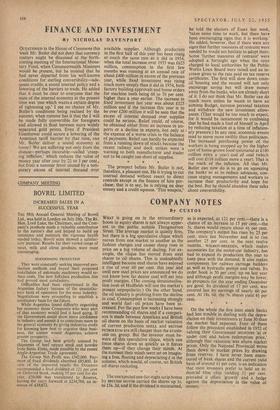COMPANY NOTES
By CUSTOS
WHAT is going on in the extraordinary boom in equity shares is not always appar- ent to the public outside Throgmorton Street. The average market is quietly firm, but there is a big speculative clique which moves from one market to another as the fashion changes and causes sharp rises in price on a big volume of dealing. For ex- ample, the clique has moved from steel shares to oil shares. This is undoubtedly intelligent because steel shares have enjoyed a rise of over 60 per cent. this year and until new steel prices are announced we do not know how far dearer coal will eat into profit margins. (The coming denationalisa- tion issue of Hadfields will test the market's present unpopularity.) On the other hand, the oil industry is profiting from the decline in coal. Consumption is increasing strongly and world fuel - oil prices have been in- creased. For the past few weeks I have been recommending oil shares and if a compari- son is made between American and British oil shares on the basis of market valuation of current production SHELL and BRITISH PETROLEUM are still cheaper than the STAND- ARD OIL group. But the investor must be- ware of this speculative clique, which can force shares down as quickly as it forces them up—if they change their minds. At the moment their minds seem set on imagin- ing a free, floating and depreciating £ in the autumn, which would, of course, set British oil shares rocketing.
The unexpected one-for-eight scrip bonus by BRITISH MOTOR carried the shares up ls. to 15s. 3d. and if the dividend is maintained, as is expected, at 121 per cent.—there is a chance of an increase to 15 per cent.—the 5s. shares would return about 41 per cent. The company's output has risen by 25 per cent. since last November and is to rise another 25 per cent. in the next twelve months. WILMOT-BREEDEN, which makes accessories for the motor-car industry, has had to expand its production this year to keep pace with the demand. It also makes components for railway carriage builders as well as hydraulic pumps and valves. Its order book is 50 per cent. up on last year and although profit margins may be lower, its prospects for the year ending December are good. Its dividend of 17 per cent. was covered last by earnings of nearly 60 per cent. At 18s. 6d. the 5s. shares yield 41 per cent.
On the whole the five joint stock banks had less trouble in dealing with the depre- elation on their investments at June 30 than the market had expected. Four of them follow the precedent established in 1952 of valuing their Government securities 'at or under cost and below redemption price,' although that valuation was above market prices. Only the National Provincial wrote them down to market prices by drawing from reserves. I have never been enam- oured of bank shares and the current yield basis of around 41 per cent. is an indication that most investors prefer to hold an in- dustrial blue chip yielding 31 per cent. provided it otters 'growth' and a hedge against the depreciation in the value of money.


















































 Previous page
Previous page